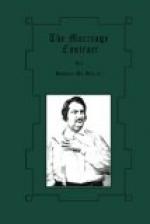“Ah! my dear mother, Paul will never be an obstacle to our happiness, yours and mine,” murmured Natalie, as she went to sleep.
“Poor darling! she little knows that the man has ruined her.”
Madame Evangelista’s soul was seized at that moment with the first idea of avarice, a vice to which many become a prey as they grow aged. It came into her mind to recover in her daughter’s interest the whole of the property left by her husband. She told herself that her honor demanded it. Her devotion to Natalie made her, in a moment, as shrewd and calculating as she had hitherto been careless and wasteful. She resolved to turn her capital to account, after investing a part of it in the Funds, which were then selling at eighty francs. A passion often changes the whole character in a moment; an indiscreet person becomes a diplomatist, a coward is suddenly brave. Hate made this prodigal woman a miser. Chance and luck might serve the project of vengeance, still undefined and confused, which she would now mature in her mind. She fell asleep, muttering to herself, “To-morrow!” By an unexplained phenomenon, the effects of which are familiar to all thinkers, her mind, during sleep, marshalled its ideas, enlightened them, classed them, prepared a means by which she was to rule Paul’s life, and showed her a plan which she began to carry out on that very to-morrow.
CHAPTER V
THE MARRIAGE CONTRACT—THIRD DAY
Though the excitement of the fete had driven from Paul’s mind the anxious thoughts that now and then assailed it, when he was alone with himself and in his bed they returned to torment him.
“It seems to me,” he said to himself, “that without that good Mathias my mother-in-law would have tricked me. And yet, is that believable? What interest could lead her to deceive me? Are we not to join fortunes and live together? Well, well, why should I worry about it? In two days Natalie will be my wife, our money relations are plainly defined, nothing can come between us. Vogue la galere—Nevertheless, I’ll be upon my guard. Suppose Mathias was right? Well, if he was, I’m not obliged to marry my mother-in-law.”
In this second battle of the contract Paul’s future had completely changed in aspect, though he was not aware of it. Of the two persons whom he was marrying, one, the cleverest, was now his mortal enemy, and meditated already withdrawing her interests from the common fund. Incapable of observing the difference that a Creole nature placed between his mother-in-law and other women, Paul was far from suspecting her craftiness. The Creole nature is apart from all others; it derives from Europe by its intellect, from the tropics by the illogical violence of its passions, from the East by the apathetic indifference with which it does, or suffers, either good or evil, equally,—a graceful nature withal, but dangerous, as a child is dangerous if not watched. Like




